Review: Ted Lasso, "So Long, Farewell" | Season 3, Episode 12
How do you solve a problem like a series finale that refuses to acknowledge if it's a series finale?
Yesterday afternoon, Apple made an announcement: after releasing episodes of Ted Lasso’s third season at 9pm eastern on Tuesdays since it premiered in March, they were switching course for the finale. “So Long, Farewell,” the series’ longest episode yet, would instead be going live at 9pm pacific.
It’s a baffling decision, on a number of levels—I know I saw plenty of tweets of frustrated fans who didn’t see the announcement earlier in the day and had clearly organized their evenings around watching it before bed. While critics like myself were inclined to stay up to watch in real time, the show’s audience likely chose to go to bed, and will need to find time to watch the episode today. And this is especially an issue when Apple and the show’s producers consciously turned this finale into the ultimate mystery, refusing to confirm whether this was actually the end of the show or simply the end of Ted Lasso’s time at AFC Richmond. That’s more existential suspense than you’d expect from a finale to a feel good football show, and when Tuesday started the show’s most dedicated fans thought they’d be getting an answer three hours sooner.
It’s fitting, then, that they never got an answer at all. “So Long, Farewell” is definitive about Ted Lasso leaving Richmond behind in order to return home to be close to his son, to the point that we get a Cat Stevens montage lest we fail to understand the importance of fatherhood to his and the show’s identity. It also leverages the inherent thrill of the final match of the season determining the Premier League championship as a way to tie up the loose ends from a season full of them. But when it came time to make a definitive statement on whether the story of AFC Richmond would be continuing without Ted, “So Long, Farewell” chooses the path of absolute chaos, leaving viewers entirely unsure if these characters will be returning to their screens at some point in the future.
The interplay between these elements creates a finale that—as expected—resolves none of the mess the show has created amidst ballooning episode lengths and increasingly fractured storytelling. Numerous moments in “So Long, Farewell” capture the immense power of this show’s characters and storytelling, but they’re mostly those that bypass the third season entirely, which frankly only exacerbates my ongoing frustration with the show and its storytelling. Where Ted Lasso lands at the end of its planned three-season arc makes perfect sense, which makes it that much harder to understand how writers who grasp the central idea of this story so well managed to find so little sense in the majority of stories they told throughout this third season.
Ted and Rebecca’s relationship has always been the core of Ted Lasso, and so it wasn’t shocking to see it emerge as the cornerstone of this finale. And while Ted first breaking the news to her becomes one more scene that absurdly happens off-screen (in this case mostly so they can ruthlessly tease the ‘shippers with this cold open), the rest of the episode uses her denial and his avoidance to explore an important question: how much are their respective identities tied to each other and to the team they respectively coach and own? In her attempts to convince him to stay, Rebecca ties their fates together, arguing “if you go, I go.” But the truth the finale explores is that while Ted’s connection to Richmond isn’t strong enough to keep him away from his family, Rebecca’s ties to the team are deeper than she first realized, going beyond her feud with Rupert and tapping into her own need for a sense of family.
And honestly, if we ignore the majority of the storytelling for these two characters this season, I like this story a lot. But I’m—to no one’s surprise—stuck on how the rest of the characters’ stories this season were in service of this conclusion. Imagine if they had bypassed the absolutely atrocious psychic storyline and actually focused on Rebecca being more involved with the day-to-day operations of the club and its ties to the local community. Why couldn’t Ted have spent less time siloed in an obsession over his ex-wife’s new boyfriend and had instead been investing in relationships with his team and its players that were becoming strained by the understandable distractions at home, given that the premiere had already established his homesickness effectively? The attempt to reframe the psychic’s prediction as Rebecca becoming the “club matriarch” is tortured, and the fundamental absence of any resolution around Ted and Michelle’s relationship makes all that back-and-forth an even bigger waste of time. If the writers understood the core of these characters, how did they have so little grasp of how to build meaningful tension and drama around them on a weekly basis?
I don’t want this review to fall into a pattern of rehashing old criticism, because you already read all of that throughout the season, but it’s hard when the finale often has this problem of landing in the right place with seemingly no regard for how absurd the path there had become. I spent the entire season at odds with the show’s depiction of Nate’s “redemption” arc, bristling at a fundamental disconnect between how the writers seemed to understand his past actions and my own interpretation. And while I truly would have preferred shooting him into the sun, I was willing to accept a redemption arc provided it had him reckon with his past actions in a meaningful way, but the show refused this at every turn. And given all of this, I was therefore shocked to see that Nate’s triumphant return to Richmond wasn’t as a new assistant coach, but rather as “assistant to the Kit Man,” where he spends the episode joyfully being the lowest rung of the ladder up until Ted plucks him from the bench to assist in the game-winning setup.
Again, it’s that disconnect: how do the writers understand that Nate needs to be humbled in this way but seemingly didn’t grasp that having characters like Colin forgive Nate offscreen was insane? Everything about how the writers had told this story so far seemed like they had bought into Nate’s greatness, and in his purpose in life being coaching, to the point that my existential fear has been the show having him take over for Ted after his departure. And as much as I’m glad that didn’t happen, if the writers knew enough to know that Nate’s return to Richmond needed to be navigated more carefully, how did this seemingly have no impact in how they mapped out the story before this point?
While I know I spent much of the season complaining about Nate, my biggest critique of the finale itself ends up rooted in what I previously felt was the season’s most effective storyline. Pairing Roy and Jamie has been the season’s saving grace, offering two characters with room to grow space to better understand themselves. Their stories suffered from some of the same sloppy plotting as everything else at times (I went on a Twitter rant about Roy’s shirt the other day), but there was a clear sense of progression in their respective journeys that was well-served by their mentor/mentee dynamic evolving into a legitimate friendship.
Which is why forcing them back into a love triangle with Keeley in this finale was such a fucking bummer. The show did the exact same thing at the end of the second season, so I shouldn’t be surprised, but this is the one “ending” of the season where I think they dropped the ball. The landing points for every other character basically make sense, but choosing this as the end point for Roy, Jamie, and by extension Keeley is an affront to their respective arcs. The show wants credit for the fact Keeley rejects the premise entirely, booting them both out of her house, but that wasn’t worth the flattening of their journeys for the purpose of creating that moment. It muddles everyone’s stories to no particular end, and the image of them nursing their wounds wasn’t worth that. It also doesn’t work for Keeley to reclaim her independence in an episode that sidelines her character and her agency otherwise, effectively admitting that the effort to build a story around her career failed to generate substance that would still resonate in this finale.
And honestly, robbing us of a more intimate, focused moment of Roy and Keeley confronting their relationship independent of the toxic masculinity of the feud for her affection is just kind of mean. Breaking up Roy and Keeley never really made sense to begin with, but if you’re going to craft a story around Roy self-sabotaging and then growing as a person throughout the season, having things boil down to an external force in Jamie cheapens that story instead of enhancing it. Roy’s embrace of the Diamond Dogs is a big moment for the character, and so I get that they weren’t interested in giving him a happy ending with Keeley. But why couldn’t Keeley have turned down Roy because of lessons she had learned in her firm’s initial failure, and her desire to focus on getting this second chance right? We’re robbed of an actual, vulnerable conversation between the two characters, and while I was never so much of a ‘shipper that I’m mad they’re not together, I think we deserved a greater acknowledgment of their relationship in how their respective stories resolved here.
Jamie’s story works better when it’s tied to his actual play, and this is where “So Long, Farewell” has more success in applying band-aids to the season’s arcs. No, Richmond’s miraculous season doesn’t really make any logical sense, but there’s an inherent climax to a season-ending match like this one, and the “Lasso Way”—scratch that, “Richmond Way”—has shown its capacity to overcome such challenges in the past. The finale’s greatest accomplishment is reframing the show around the power of the club and its culture, and the parade of cameos of past bit players—Ted’s neighbors, that When Harry Met Sally couple, etc.—gives a good glimpse of its extended reach. And while none of the events in Richmond’s 3-2 victory over West Ham fleshed out any particular character arcs from this season, it tapped into the show’s endless well of feel-good football vibes to capture the emotional journey of the series as a whole.
And yes, I’m too deep in the weeds of criticizing the show to get outright emotional, but the various montages and speeches and collective hoarding of ripped up pieces of paper reminded even the cynics among us of the show’s innate compassion. The writers regularly overestimated its capacity to contain certain types of stories within this framework, but they never misunderstood how it could be used to connect with audiences. Ted Lasso knows we want to live in a world where Colin’s story can end with a triumphant on-field kiss with his boyfriend that doesn’t make the front page of the tabloids and turn his life into a living hell. It operates with the belief that most people don’t want to dwell on the rampant rise in homophobia, and that they’d rather have the Lassofied version of coming out in professional sports. And I have to acknowledge that they’re probably right, even if I also believe that addressing issues like racism or homophobia in sports (and life) without fully embracing the consequences is borderline unethical in our current climate.
Overall, though, “So Long, Farewell” is well-calibrated in terms of how it celebrates the core ethos of the show itself. Yes, the show indulges in a Greyhound victory, giving us a final image of Ted doing the running man among his players like in the viral video from his college days. The callbacks to past seasons—the winning play, the dog on the sideline—give everything a full circle feeling, especially given the similarities to season one as cell phones ding signaling that their fate wasn’t fully in their own hands. But although it wins them the game, the Richmond Way can’t overcome Man City’s win in their own final match, and as with their initial relegation the “fairy tale” has a limit placed on it. Ted may have transformed this team and the people within it, but he didn’t also win the Premier League, which gives both him and the team something to play for in the future.
The embrace of the meta-narrative of whether or not this is actually Ted Lasso’s final season is a very conscious choice, and it’s one I’m still trying to parse. After we fade to black on Richmond’s victory, we land on Ted in the airport, where we learn that the premise of the show is still intact: Rebecca’s decision to shift to a co-operative ownership model (in which she retains control) makes the team a part of her future, while losing the premier league means that there would still be a goal for Ted to chase if he wanted to stay. It’s the moment where the finality of Ted’s story fully severs from everyone else’s, which is why it makes sense that Beard bails on their flight home given his love for Jane. While I’d argue the season’s narrative failings demonstrated that Ted’s character was disconnected from the show’s larger storyline anyway, here we do get a diegetic justification for why he’s going back to Kansas (City) and leaving the world of AFC Richmond behind.
It’s what happens next where things take a turn. As “Father and Son” plays, we get an extended montage of the rest of the show’s cast. Rebecca settles into life with her new family. Roy becomes manager. Nate and Jade sit happily in the window table at Taste of Athens with his family. Jamie reconnects with his father. Sam on the Nigerian team. Trent signs a copy of his book for Ted’s neighbor Shannon. Sharon Fieldstone returns as the club’s full-time therapist. Mae and the barflies celebrate with their new shares of the club. Keeley presents Rebecca with plans for an AFC Richmond women’s team. And then we end on Beard and Jane’s Stonehenge wedding, where Colin, Dani, and Isaac have found love of their own. If this is truly a series finale, this montage ensures that we’re given assurances of their respective happy endings.
But in the final note of the season’s Wizard of Oz riff, Ted wakes up on the plane. Everything we’ve just seen has been a dream, more specifically his dream. Whether or not audiences pick up on that, though, is going to be interesting. The thing about the montage that has stuck with me since last night is that Ted’s dream is mostly rooted in reality, or at the very least the show’s reality. Rebecca running into the dude from Amsterdam is admittedly ridiculous, but it’s the kind of ridiculous that we’re meant to see as being possible in this world, given its rules (and, as someone noted in the comments, it happened before the snowglobe shifted us into the dream). And everything up until Beard’s wedding is more or less grounded, and a natural progression from where we left off with those characters. It’s only at the wedding where things take on an air of complete fantasy, and even there it’s only because Ted wakes up right after and it becomes easier to piece together the fiction: Ted Lasso would be at the wedding of Willis and Jane, especially in the show’s fantasy world where there’s a direct flight from Kansas City to London.
It’s a choice that allows Ted Lasso to create an air of finality without finalizing anything. Despite the episode’s decision to present Michelle’s boyfriend Jacob as entirely disinterested in the match and constantly dismissive of it, we get no clear picture of the state of Ted’s relationship with his ex-wife, or the family dynamic they’ve found. We know he’s coaching Henry’s soccer team, but we have no idea what kind of career he might have found, or whether there’s any chance he could return to England at some point in the future given that Henry will go to college before Ted is likely to retire. And although we get Ted’s dream for the friends he left behind in the U.K., we have no idea how much any of that was true—maybe Nate became coach of AFC Richmond as we feared. It’s a pretty clear end to Ted’s story, based on the final shot, but we can choose to believe—get it?—what we want about what the rest of the story looks like from here.
Which is going to make it particularly challenging for the show continue in some form. I don’t know how much dialogue took place between Sudeikis and Apple regarding this ending, but personally I’m struck by the active refusal to chart a path forward. It’s clear that Hannah Waddingham is capable of anchoring a version of this show, based on her performance’s consistent strength even while stranded in terrible storylines, and Ted’s insistence to Trent that it was “never about me” actually rings true even if those stories were a pretty consistent mess. The hint at a possible women’s team is also an incredibly clear and obvious track for a spinoff series to explore, creating a space for existing characters while exploring new dynamics. But if the show were to come back in any form, embracing any details from Ted’s dream will render the show a figment of his imagination, which would actually work better to justify some of its worst instincts but would also destroy any semblance of being grounded in our reality. It’s an ending that seemingly acknowledges that we’re invested in these characters and their future, but in doing so cuts off seemingly easy paths to further stories in ways that would seem to suggest Sudeikis is not willing to reward that investment by keeping the show going.
We’ll likely never know the full details of any tensions between Sudeikis and Bill Lawrence ahead of the latter’s exit from his showrunning gig—perhaps things were as amicable as Bill’s social media presence suggests, but the chaos of the season’s storytelling presents some pretty clear philosophical distinctions. And so I don’t know how much they would have discussed this ending, which reminds me most strongly of the challenge Lawrence had with Scrubs. Scrubs ended in its eighth season with a conclusion that similarly relied on fantasy to end its story, as JD walks outside the hospital to find home movies of an imagined future. It’s a powerful emotional endnote, which made it particularly egregious when the character returned as a recurring presence in Scrubs’ ninth season. Lawrence has since agreed that NuScrubs never should have been presented as Season 9, but at the end of the day he saw it from a pragmatic lens of wanting to keep his cast and crew employed. It undermined the ending he had created, but it maintained his commitment to the people who made that ending happen, and that for him was more important.
What we’re going to learn over the next few months is how important Ted Lasso is to everyone involved. We know that Sudeikis is done, but is he so done that he would deny his fellow cast members and producers the opportunity to keep building on what they created? And even if the compassionate argument for keeping people employed doesn’t resonate, Apple is still thirsting for Emmy nominations, and you have to think they’re doing everything in their power to keep the show intact for the sake of their awards slate. And when you leave the bubble of a critical space like this, it’s clear that the show’s general audience would gladly tune in for another three seasons of AFC Richmond.
Would you? Would I? As a critic, I would find the idea of a post-Lasso season of this show too compelling to pass up, but the clear struggles to balance Keeley and Nate’s corners of the story this season does mean that a significant creative shift would be necessary for a proposed Richmond sequel to work to its full potential. But one thing “So Long, Farewell” reinforced is that these characters are resilient: Nate might be too far gone, but there’s hope for Keeley, and in general these remain characters whose future—fantasy or not—we’re invested in. For all of the show’s failings this season, there was still considerable emotion in this finale, which suggests there is a path to exploring that emotion with a new assemblage of characters and stories in the future.
We’re covering three “series finales” this week at Episodic Medium, and it’s fascinating to see how each show approached this challenge. After Succession chose a natural endpoint to the story it was telling while keeping the world of the show moving along, Barry delivered a finale that definitively closed the book on the show and its premise. But never not the show that does too much, Ted Lasso has tried to thread the needle between the two, making it difficult to wax poetic about the show and its legacy like a series finale review is inclined to. “So Long, Farewell” captures the essence of a show that created an intense emotional connection with its audience and then struggled with how to harness that into an ongoing series. And while the show’s future will shape how we think about this episode, my central takeaway will always remain that despite having written 24 increasingly critical reviews, I still felt those emotions throughout this finale. I still cared about this show and its characters, even as the writers seemed to care less and less about basic logic in their stories. And that’s an achievement, if not one that lives up to the potential of this once-deservedly Emmy-winning series.
Stray observations
Okay, but truly, the choice to tease the idea of Ted and Rebecca sleeping together has to be one of the cruelest engagements with an online fanbase in recent years. Even as someone firmly against it who was really happy with how the finale respected their platonic connection as the heart of the show, it was hard to enjoy the “win” when you realize how the show just actively kicked them in the teeth like that. They were wrong, but they didn’t deserve that (and then Beard in a thong to wash it down).
If there’s a “thesis” in the show, it’s in the first and final meeting of the Roy Kent era of the Diamond Dogs where they talk about personal growth and whether people can change. Ultimately Nate’s presence triggered my ongoing frustration with how they conceived of that story, but it reminded me that I wish I could value the throughline of Ted’s impact on the team and its culture without the Nate of it all.
It didn’t end up really mattering, since Rebecca spent the entire episode insisting she didn’t care about Rupert anymore so it’s hard to invest much in him, but what was with the clear effort to soften the character in the Akufo episode to then have him play the sniveling, conniving villain who gets his comeuppance here? It was also weird every time he walked by Nate because we missed the entirety of that dissolved relationship, and so there’s nothing to refer back to. Puzzling stuff, even if it had a clear utility in telling this game’s very simple story.
The Judge McAdoo sequence to start was super fun, and was perhaps the best case before the dream sequence of the idea of just continuing on the show following this team the next season. A pity that it also ends up converging back on Nate, and reminding us that this team allegedly overcame all his past actions offscreen, but alas.
Speaking of Isaac, giving him the ball during the penalty kick was kind of payoff for his blowup in practice, but I do wish we’d have gotten a stronger team story that could have played with his deserved suspension from the homophobia incident and let this moment have some more substance to it. (Also, him kicking it through the net was nonsense).
And yes, I also thought the Sound of Music performance was nonsense, but I have made my peace with the show’s belief that a professional soccer team preparing for a potentially life-changing match would spend time learning choreography, so I’m just going to not dwell on it.
Keeley may not have gotten a story to speak of, and I wish she could have had a more meaningful conversation with Ted, but the snowglobe coming full circle was nice, and I did like the callback to “everyone decent?” from the first season as she came through the locker room.
Staging Ted and Rebecca’s big conversation in the seats of the stadium, mirroring the opening credits, was a nice touch.
Harriet Walter gets a lovely if brief scene to fill out her big week—not sure if it’s enough substance to secure a Comedy Emmy nomination to go along with her Drama one for Succession, but we’ll see.
Speaking of Emmys, I feel like there’s too much goodwill and momentum in the comedy categories for Ted Lasso to follow Game of Thrones into the “Messy Final Season Still Wins Emmy” pattern, but stranger things have definitely happened.
The care package from Zava was one way to pretend that story made any sense, I guess.
“It’s like he’s shooting a free throw with his feet”—honestly, that mid-game banter from Dr. Jacob was so egregious that I simply don’t know how we’re supposed to think Michelle would stay with him. I’d have rather the show sabotage him by rightfully pointing to the ethical issues in their relationship, but I suppose this was more efficient.
I don’t know why Zoreaux didn’t get a more stylish mask to begin with, but the Zorro transition was cute, and pays off a brief story that perhaps could have worked better spread out across the season.
Enjoyed the callback to tickets being left under the name of country singers (which is how Roy got his seats following his retirement).
Along similar lines, Ted figuring out what offsides are and calling back the goal before Video Replay did? A nice full circle moment, even if I do sort of feel like Ted just learning this is still weird.
It’s a pity they couldn’t get the actress who played Nora back, as it would have been fitting for her to be there with Sassy. We also didn’t get a final moment for Sassy and Ted, but they really pivoted to the ex-wife at a certain point, making it harder to resolve that dynamic.
Beard’s home video was set to “A Beautiful Game,” which I immediately recognized as Ed Sheeran but sort of presumed was just a song I’d tuned out, as opposed to a new single tied to its appearance in the show.
There’s more that we could get into, but I think this closes the chapter on my coverage of this era of Ted Lasso. I want to thank everyone who’s made these discussions so dynamic this year, especially since I know many of you followed me here from The A.V. Club. This is an example of a show that’s probably better if you’re not writing about it, but I’ve really appreciated the opportunity to write through my feelings, and hope that they’ve helped you work through your own response to the season even if you’ve disagreed. I am immensely grateful you’ve helped me create a space where reviews and conversations like these are valued, and look forward to continuing this dialogue either as the show itself finds new life or we follow the themes into the rest of Episodic Medium’s lineup. Thanks for reading, and I’ll let you know when Ed Sheeran and Max Martin get back to me about writing a song about Nate dying on the way back to his home planet.




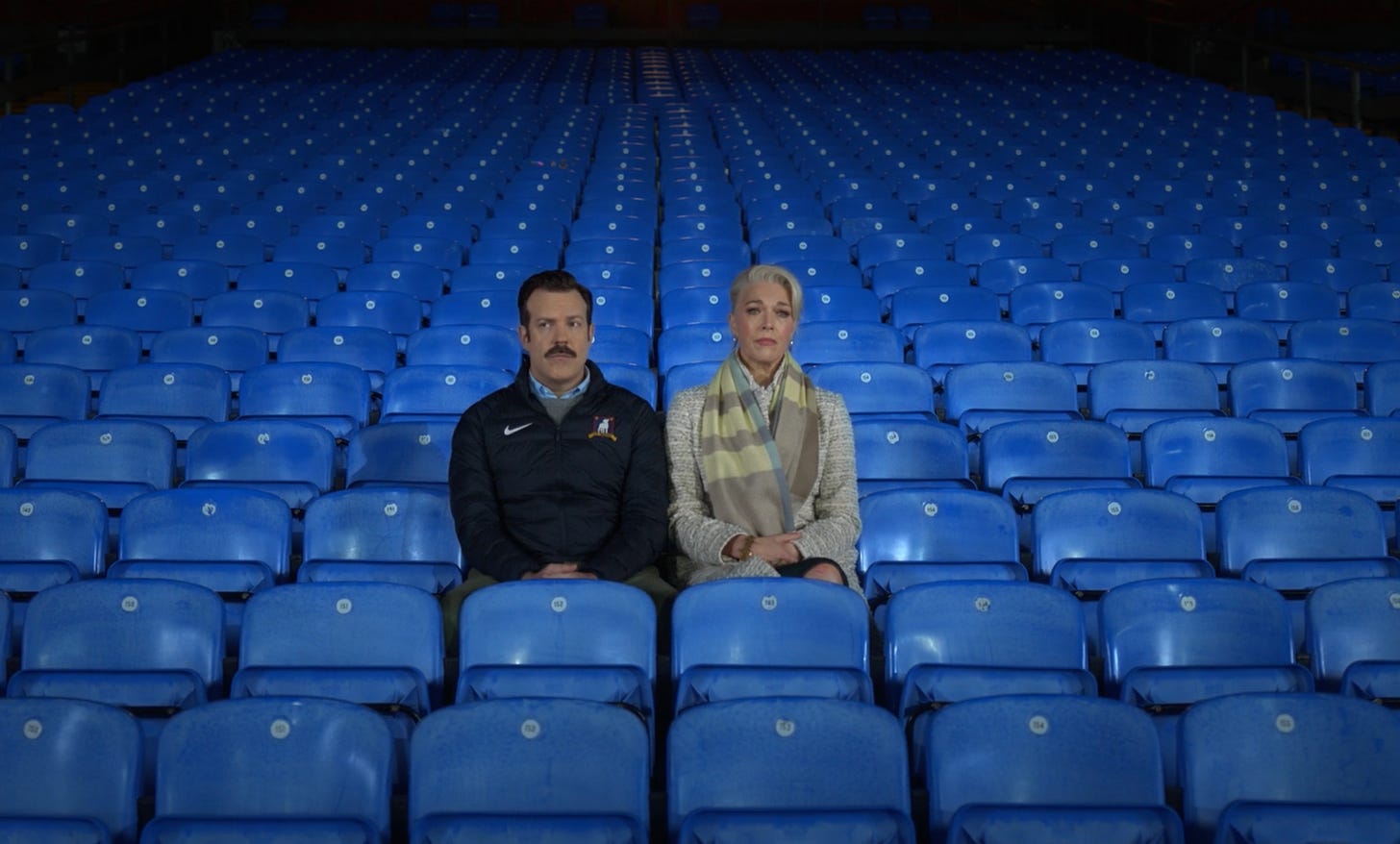
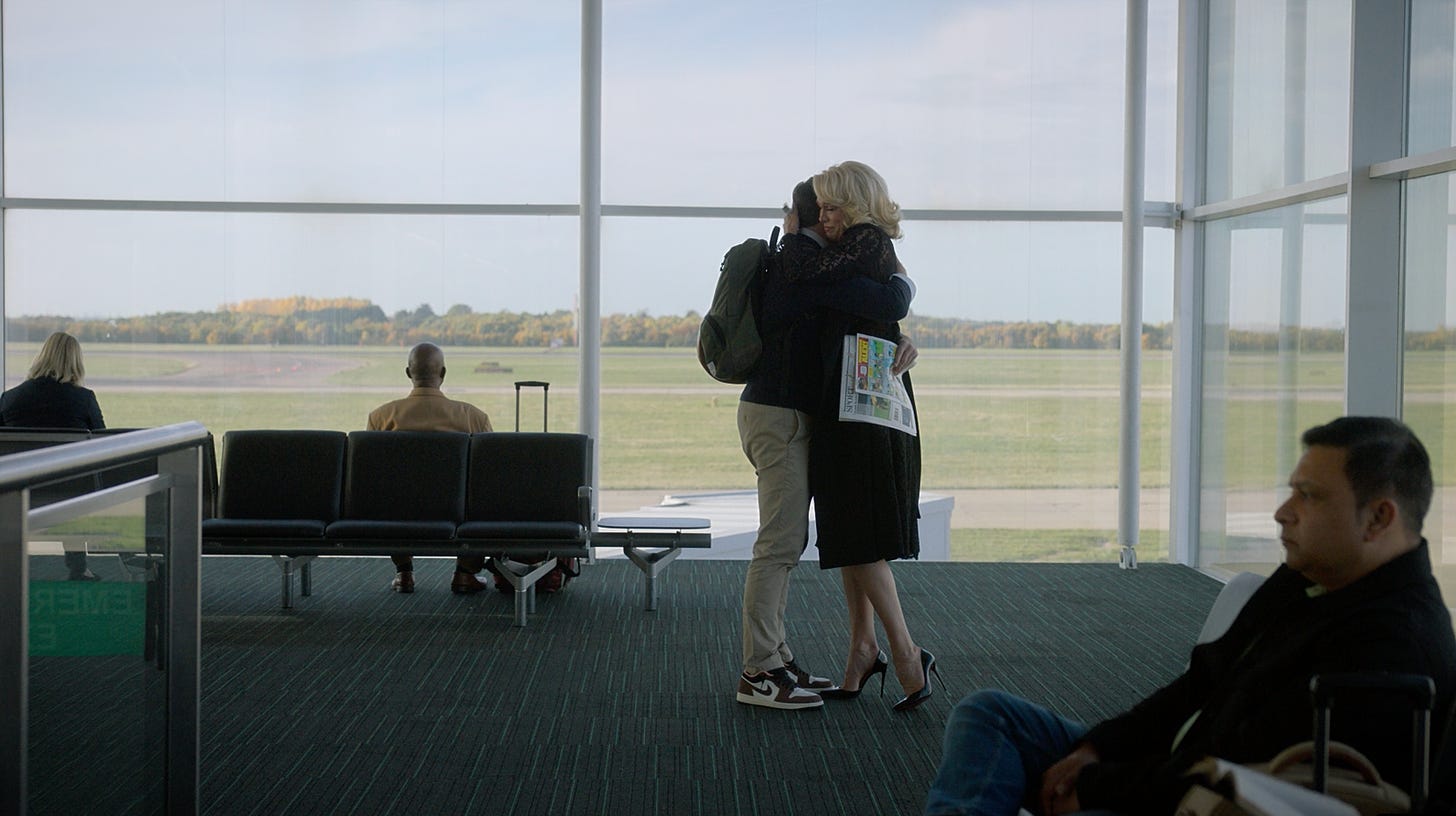
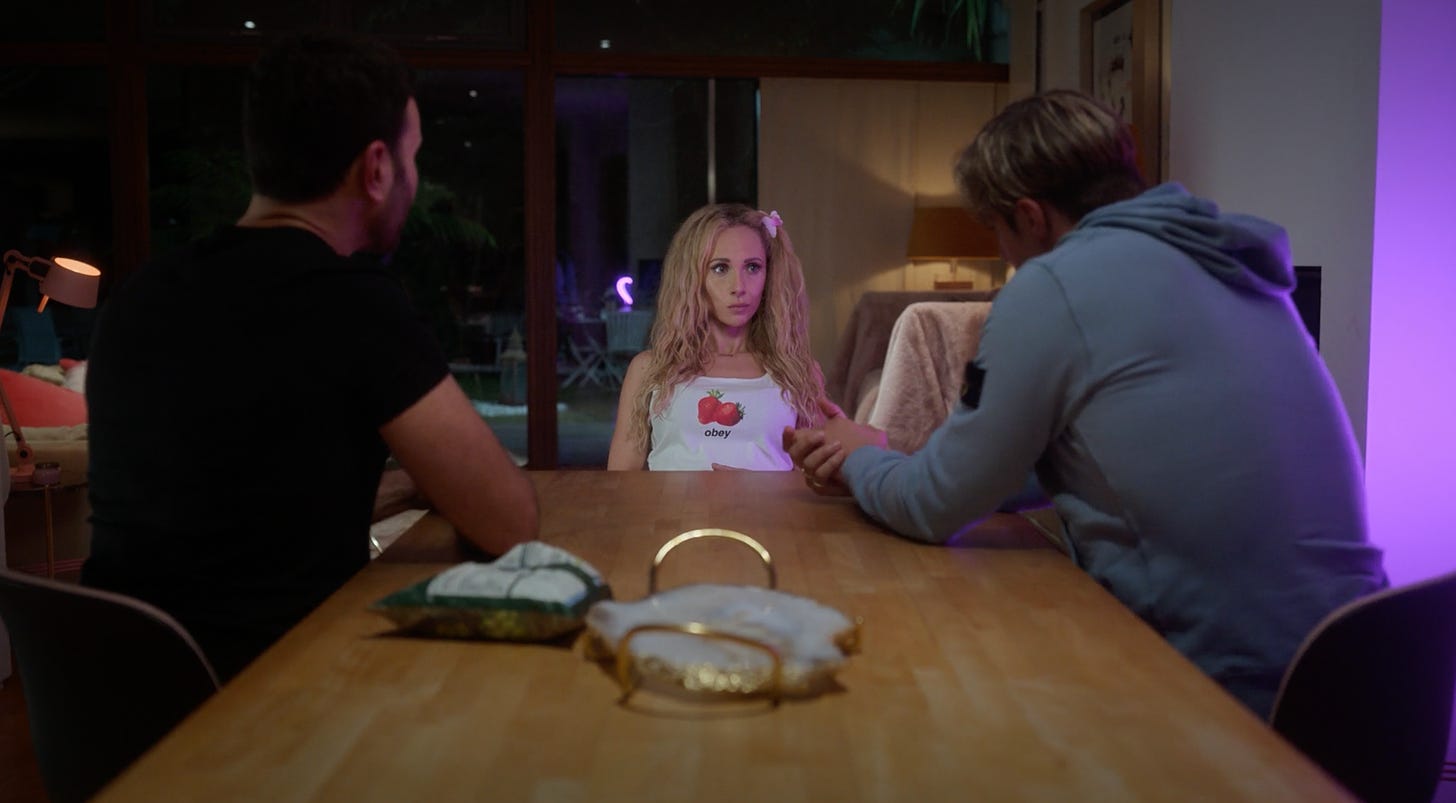
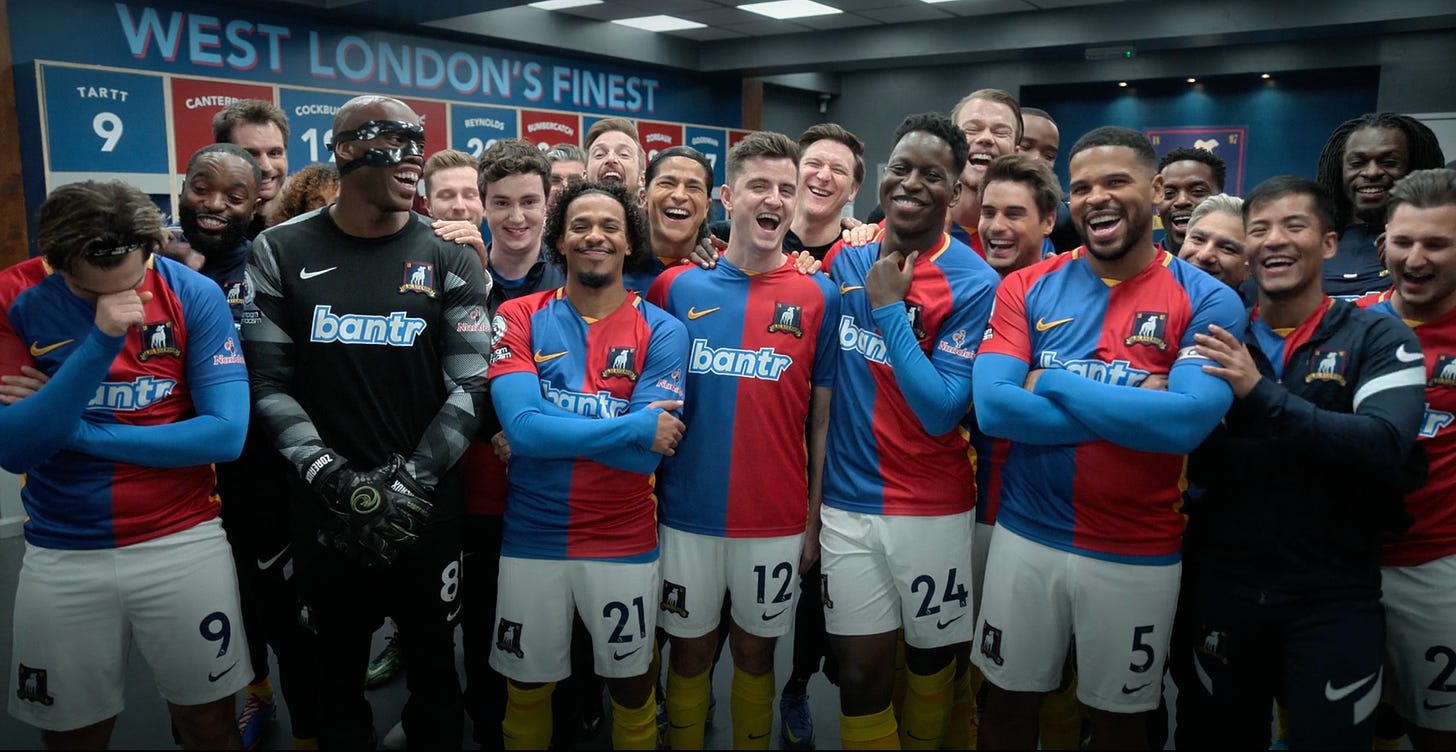
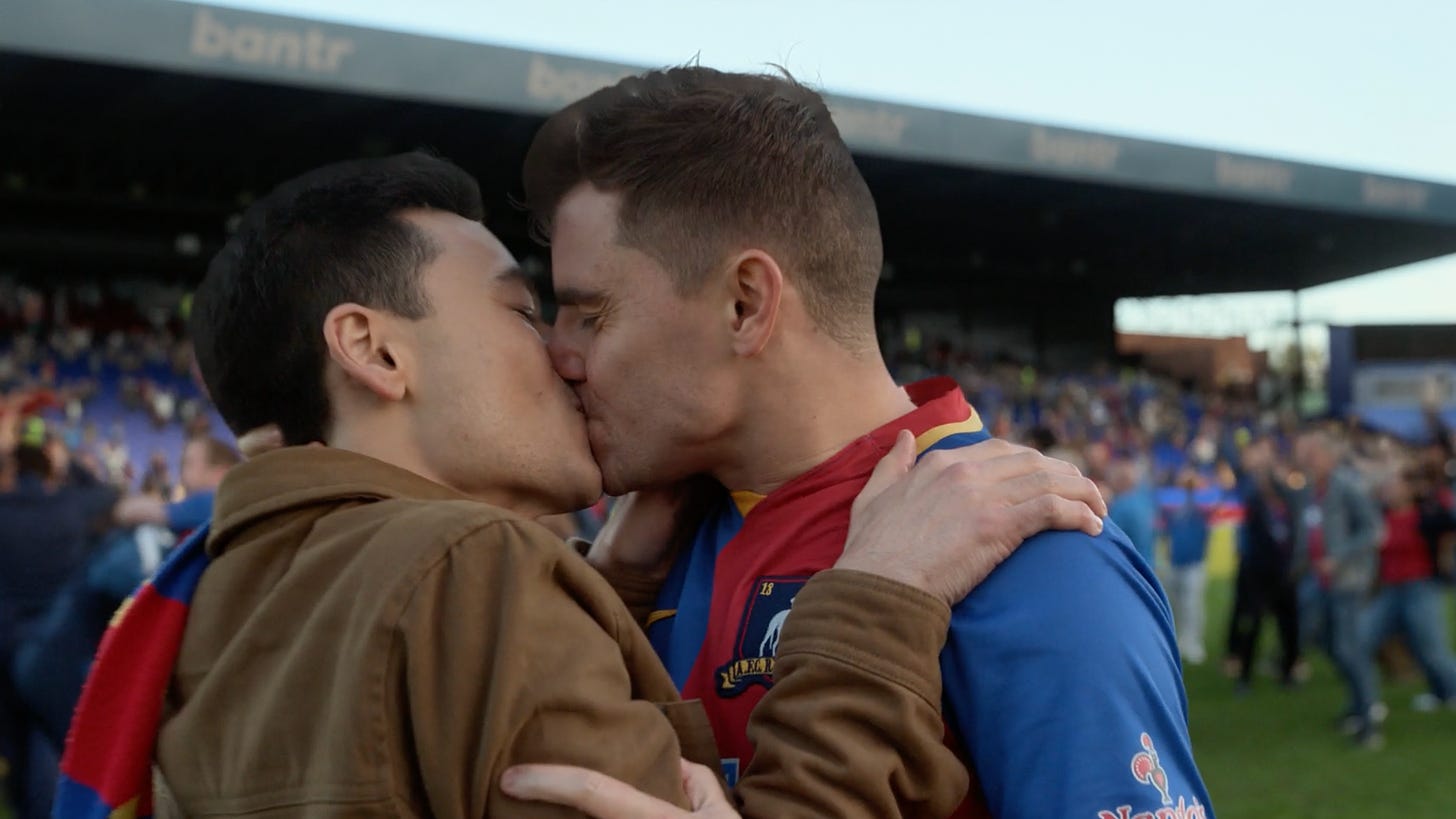
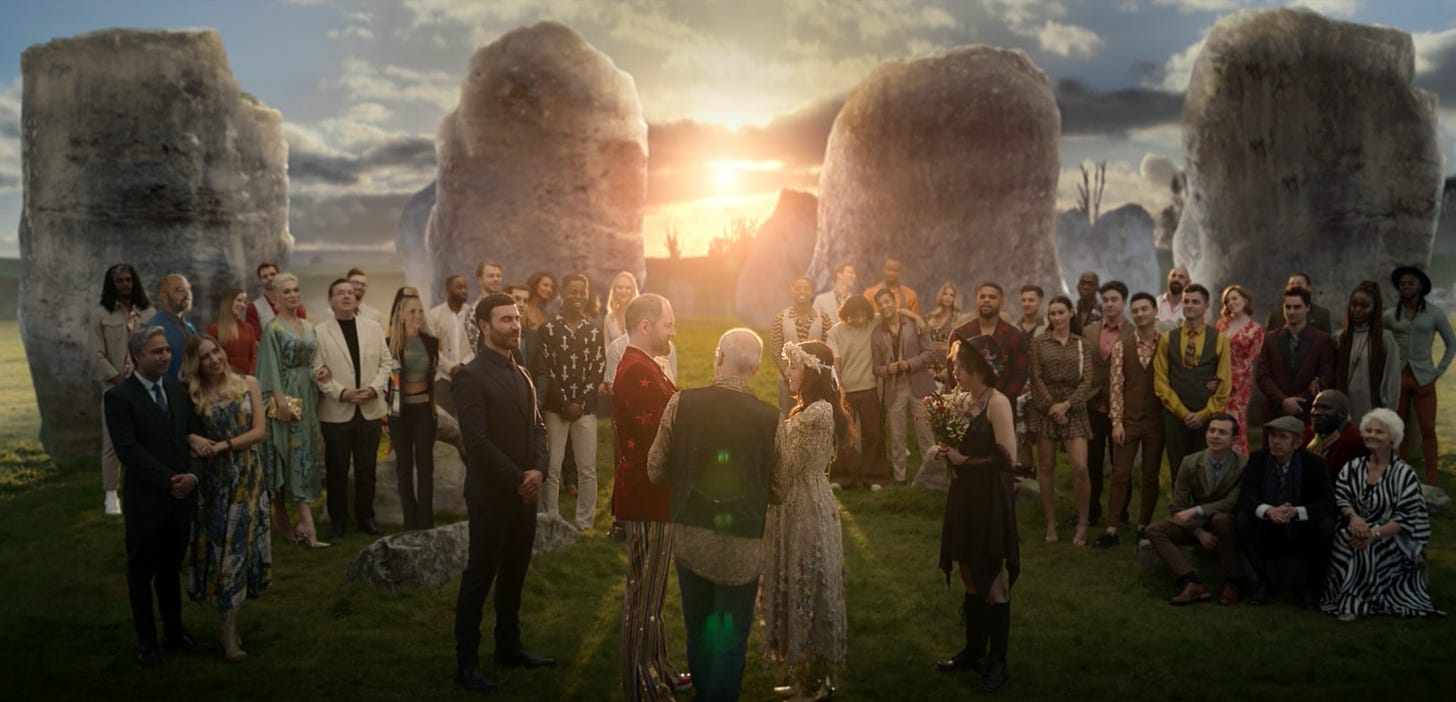
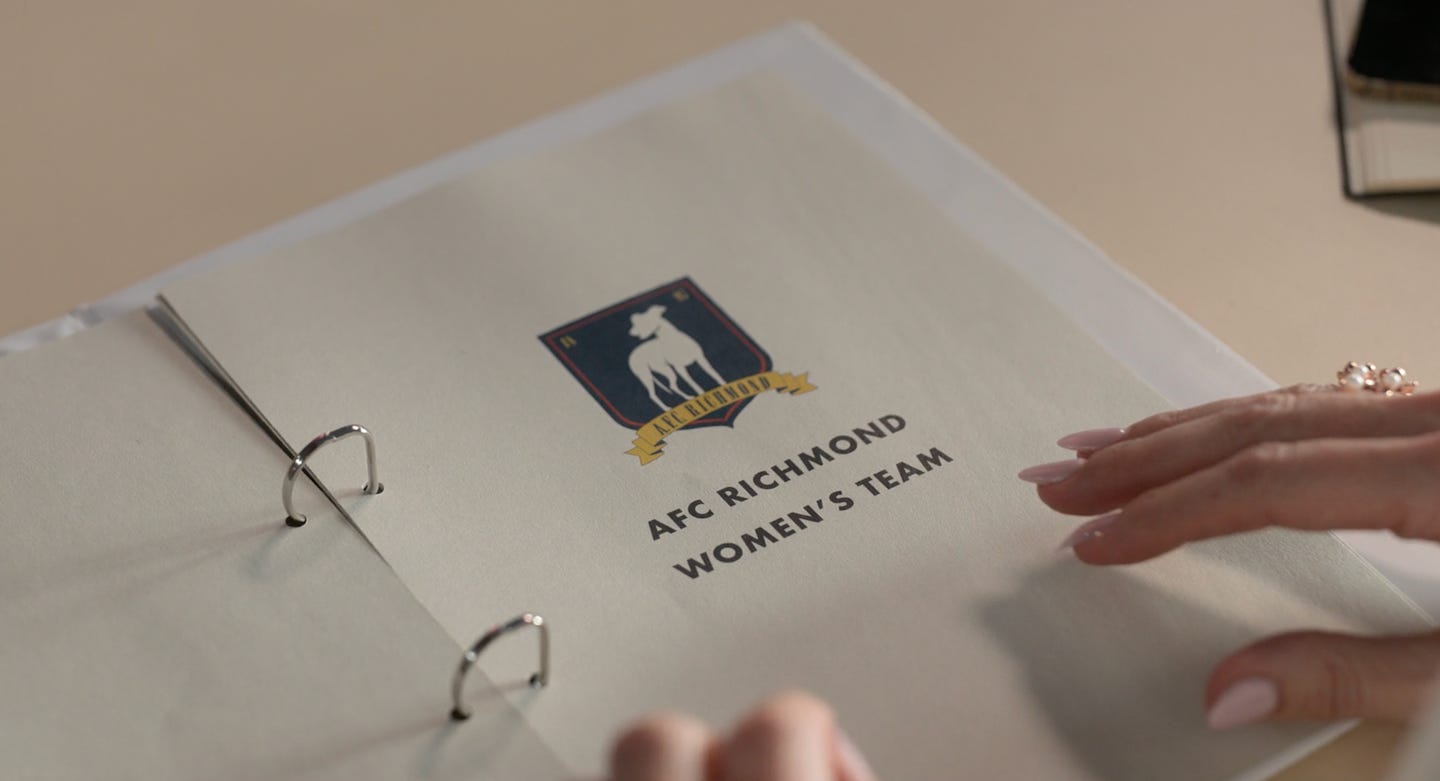
Seventy-five minutes!
On the one hand, it was more or less exactly what I expected the finale to be, in terms of how everything resolved and the sheer amount of sentiment dripping from it. On the other hand, it did not really fix my biggest problems with the season as a whole, although I did not terribly expect it to. On the third, secret hand, it was actually very funny at points, including some great freeze-frame gags, and having watched the older episodes again has given me a stronger sense for the sheer number of callbacks packed in there.
Things I expected to happen include: Ted goes back home, but Beard sticks around. Roy Kent is named the new coach after the season. Richmond wins their final game against West Ham-- although, in an unexpected twist, Man City wins theirs as well and clinches the Premier League title, with Richmond taking second.
Things I suspected might happen: Keeley doesn’t choose between either Jamie or Roy. Rebecca has a chance reunion with her Man from Amsterdam, and his daughter, which as we see in the final montage leads to them dating. Rupert Mannion’s downfall, although the final straw was not something I expected before the episode-- I predicted he might push for his team to deliberately injure Jamie once the game got going, but I was genuinely surprised that George, the coach with the short shorts, stood up to him.
Things I wanted to see and did not: Someone addressing the entire ethical problem with Dr. Jacob dating Michelle in the first place, although it seems clear he’s not long for the picture with how coldly his snark about Richmond’s season finale is received. I’m still not convinced Jane is healthy for Beard, and if the writers wanted us to believe that she is, they should have written her some scenes where she doesn’t act some combination of highly possessive and severely bipolar. Some kind of hint of personality from Jade.
Things that were good to see: Nate’s apology to Ted, long overdue-- Nick Mohammed is arguably doing the best work of anyone in this episode. Also, Dani’s apology to Zorreaux / Van Damme, complete with new face mask. Roy genuinely asking the Diamond Dogs for advice on whether people can change, after a year of putting in the work to do so and feeling like he really hasn’t.
Notable callbacks: The final goal is scored on the play Nate designed in season 1, the one with Jamie running decoy-- and he even gives the Ted-style “I’m open, I’m open!” performance Ted was trying to get out of him in season 1. Chris Powell reflecting Roy Kent’s line from season 1 about never knowing how to react to a grown man doing a silly dance-- that grown man in both cases is, of course, Ted.
Admittedly a lot of cheese in this one, but it worked pretty well on the whole. Some of that was helped by having watched the older episodes recently-- Rebecca telling Ted how much he’s meant to the club and to her personally is a lot more believable having seen season 1 so recently, than if I’d just watched season 3 straight through without reviewing any of those episodes.
All in all, though, this was definitely the weakest season of Ted Lasso. The gaps in the plotting and plausibility that started showing up in season two grew bigger and bigger in season 3; several stories felt like they didn’t have much point to them; but the show could still put together great moments and great episodes from time to time. Those often make the show worth watching through the bits that don’t work, even this season. Season 1 was nearly perfect; season 2 was good but flawed; and season 3 was even more flawed but still capable of great things, and the ending will probably lift my overall evaluation of the show a bit.
Overall, I think Myles is right; the finale lands in a good place, but it's hard to get over all the ways the plotting left huge holes or skipped over crucial scenes on the way there.
Last note, as something of a music aficionado, I enjoyed the cheekiness of following “Father and Son” in the closing sequence with “Fight Test”-- you know, the Flaming Lips song that they have to pay Cat Stevens 75% of the royalties for because of its similarities to “Father and Son.”
The Keely storyline was a trainwreck, but I'll say this.
Choosing neither of them was her second best option in that moment.
The best option would have been choosing both of them. Tell me they didn't ooze throuple energy.